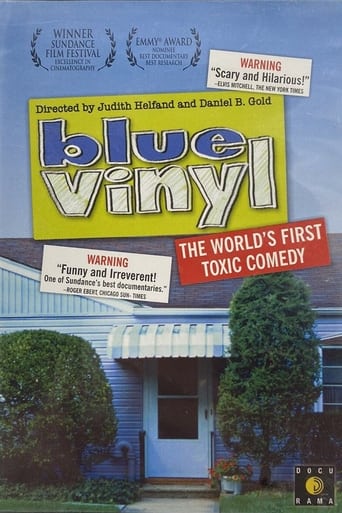opusv5
This film, already four years old, (successfully I think) explores the toxic potentiality of only one everyday item. There are scores of other contaminants out there, with the growing problem of e-waste something that will impact on everyone sooner or later. There is even a black market in e-waste disposal that sends discarded high-tech components to the developing world for crude deconstruction. One commentator referred to "Blue Vinyl" as "lefty." Actually, he or she should take note: the filmmaker notes that adult toys might contain carcinogens. This could be a big boost for the right, who generally don't approve of such items: scores of vibrators having to be discarded or recalled.
ktatlow
Blue Vinyl is lefty scare-mongering propaganda, but nevertheless worth a viewing. Helfand gives enough names and references to provide the viewer with opportunity for deeper research if desired. Chemical-phobic true believers will love the film, and skeptics will find plenty of examples of bad science and misleading presentation to debunk and debate.JH's crusade against vinyl chloride is so intense that she seems unaware of her daily use of hundreds of other synthetics, such as the toxic-spawned semiconductors in her cameras, phones, and transportation. She inflicts this intensity upon her parents, who seem to bear fairly well a level of hectoring that would surely shorten my lifespan if I had to endure it like they did. (I would have had a stroke sometime during the days-long sales presentation by the California mud architect.) She concludes that wood is a dandy safe building material, and recommends old planking recovered from demolished picturesque mills in New Hampshire, at premium cost. Since the supply of quaint old mills and barns is limited, sooner or later she's going to have to start cutting down forests, and that will probably upset some of her allies. It's not as if there are any work-related injuries or deaths in the lumber industry! (And if your house catches fire, be sure to breathe in that harmless innocent wood smoke; it's so much better for you than PVC combustion products.) Let me mention just two specific problems with the film: 1) She depicts the Bucket Brigade, a grass-roots air-sampling project in a Louisiana community. But she fails to show whether any _control_ samples were taken, which would establish whether the samples were perhaps contaminated by the _plastic_ bags in which they were collected. 2) She interviews a spokesperson for the vinyl industry (a PhD organic chemist.) She goes out of her way to demonstrate her frustration that the interview is limited to 30 minutes. Well, guess what? She doesn't even show you the full 30 minute interview; she edits it down to about two minutes, most of which is taken up by her canned questions. The least she could have done was to include the full, unedited interview in the DVD extras, but I have a feeling that would have been too fair to her nemesis.
dsa1971
I understand this movie was trying to get the message out about the dangers of vinyl but they need to be more prepared and get all of their facts straight. They kept referring to studies done 30 years ago but not much recently. Also, when Judith interviewed the representative from the Vinyl Institute she was completely out of her league and unprepared. The representative was very convincing and was not the least bit shaken by any of her questions. The representative handled her "tough" questions very easily. I was not impressed with this movie.
morachi
This is one of those documentaries where folks have a knee jerk reaction and start thinking how horrible this is and we must save the environment and I'm so glad this was brought to my attention.Problem is what exactly was brought to our attention. This "documentary" had a conclusion first and then set out to prove it. She asks folks what they think, they tell her and she then presents this as fact. When she interviews folks who have an opposite viewpoint she misrepresents what they say and then mocks it. There is a scene in this show where she goes to a convention for the makers of vinyl one of the folks mentions that two of the components in PVC are sodium and chloride which are the components that make table salt, she then says that chemical compounds such as PVC are made up of common elements. Right after this our narrator says that she was just told that PVC is safe as table salt which is absolutely not what she was told. Later on she wants to get an expert opinion on if PVC is dangerous or not, so she has two "scientists" from Greenpeace come. Gee...we know this will be a fair evaluation. Basically the rest of this show is the same way and I think you can get the idea.Stay away from this program as it's more harmful than good.
